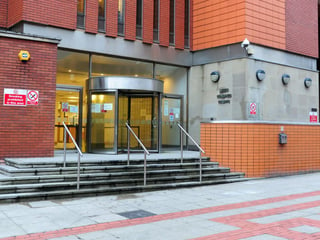Leading Yorkshire barrister calls for swift technological changes to keep criminal courts open
Richard Wright QC said the temporary scrapping of jury trials and a drastic reduction in the number of cases being dealt with in the criminal courts is putting major pressure on a legal system already creaking from a lack of investment.
Mr Wright, leader of the North Eastern Circuit, spoke after lawyers across England and Wales were told "do not go to court" as stricter measures were imposed in an effort to halt the spread of Covid-19.
Advertisement
Hide AdAdvertisement
Hide AdOn Monday Mr Wright sent an e-mail to barristers stating: "DO NOT attend court tomorrow for any hearing. If you need to conduct a hearing tomorrow do so remotely."


Mr Wright told the Yorkshire Post he hoped the short-term solutions that must to be found over the months ahead will be the catalyst for long-term change in the way the courts operate.
He said: "In the short term we can manage without doing jury trials.
"But the problem is the Government has deliberately run down the number of sitting days in the Crown court for year on year.
Advertisement
Hide AdAdvertisement
Hide Ad"That means that the delay for people waiting for jury trial is very long.


"In a bail case, we are talking about the date between pleading not guilty and having a trial is now 11 to 12 months.
"There is already a massive backlog in the system and this will simply back that up further unless a practical solution is found.
"It means it's a system that cannot cope well with extra pressure.
Advertisement
Hide AdAdvertisement
Hide Ad"The individuals cope very well with pressure - it's what we do all the time - but the system can't.
"For example, if we are not processing defendants, what's going to happen to prison numbers?
"They are going to come in the system if they are committing serious offences but they are not going to go out of the system at the other end.
"How are the prisons going to cope? These are the problems that a sheer lack of investment for years by successive governments have created."
Advertisement
Hide AdAdvertisement
Hide Ad"It really ought to be a wake-up call as to the need to invest in a proper justice system."
Bar Council, which represents 17,000 barristers, advised members not to attend court unless they are satisfied with the safety arrangements in place.
Meanwhile, magistrates were told not to attend court and lawyers were advised only to attend in person if dealing with an urgent case concerning custody, terrorism, extradition or police matters, which could not be dealt with remotely.
A list of hearings in the Court of Appeal Criminal Division being conducted remotely for the first time on Tuesday - with judges and lawyers addressing each other over either telephone or videolink.
Advertisement
Hide AdAdvertisement
Hide AdMr Wright said: "We have been engaged in a reform programme in the courts which is very ambitious, but we are always playing catch-up in terms of technology.
"We never have the best kit and the most modern technology.
"This should be an opportunity to put in place technology, not just for times of crisis, but for practical work in going forward.
"But there is a real will to keep the wheels of justice turning in Yorkshire and that's what we are all working flat out to do.
"The support we are getting from the judiciary is superb but it all comes at a financial cost. There has got to be the will to fund it."
Advertisement
Hide AdAdvertisement
Hide AdMr Wright said he hoped the swift changes that are having to be made will be a catalyst for the way the courts operate in the future.
"I think we will learn lessons from this crisis that will live with us long in the way we operate the system.
"I think there will be an increase in remote hearings, but not for defendants.
"I think it's important that defendants attend at court, and that attendance at court is not optional - you can't just do it from your front room.
Advertisement
Hide AdAdvertisement
Hide Ad"But I do think in terms of resources, the position at the moment where you have to pay a barrister to travel on public transport from Leeds to Newcastle when he could simply attend remotely, those sort of working practices could be transformed.
"I think that is going to happen across the system. There are all manner of hearings across all jurisdictions where remote working would be hugely beneficial.
"And it's not just beneficial to the people who are working in the system. It's beneficial to the public.
"It's a more efficient system. It's a cheaper system."
Mr Wight said there was a determination not to allow the upheaval to interfere with the right to a jury trial.
"That is the one thing that cannot change.
Advertisement
Hide AdAdvertisement
Hide Ad"It's a fundamental right in this country and we can't lose sight of that.
"We are going to have to find a way through this crisis. But it won't be one that involves that fundamental principle of trial by jury being altered.
"I think the rule of law is so fundamental, and in a time of national crisis, the rule of law becomes even more central to our society. It underpins our society."
